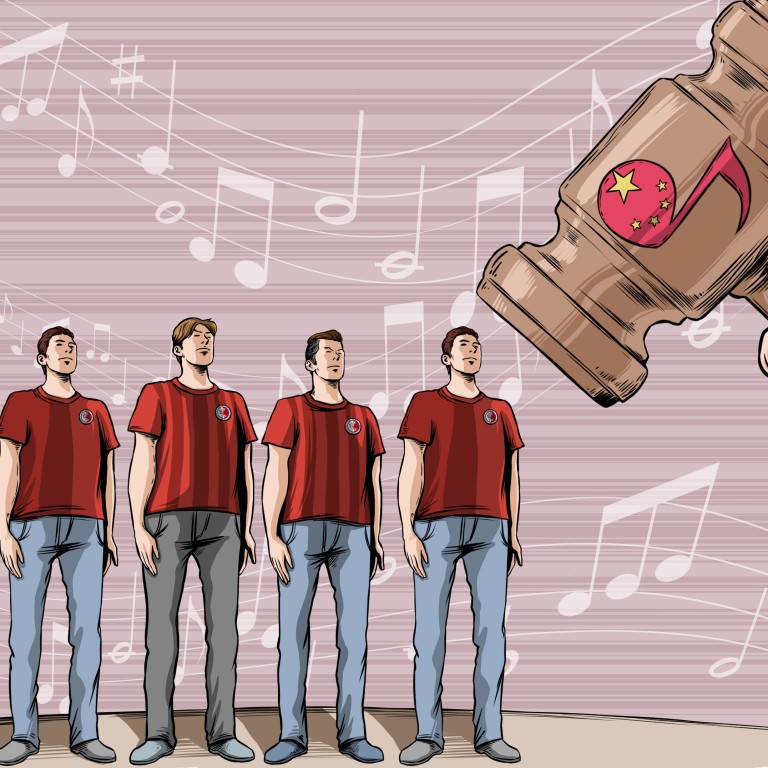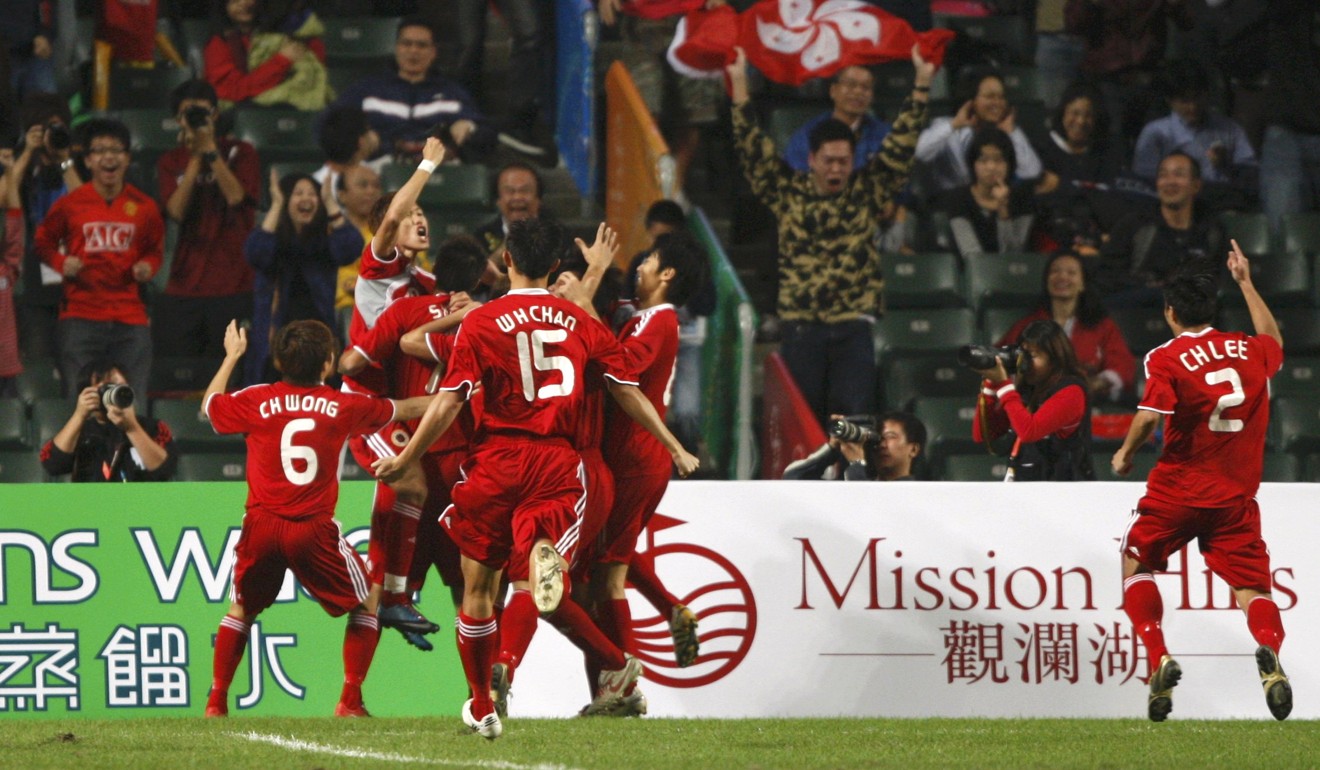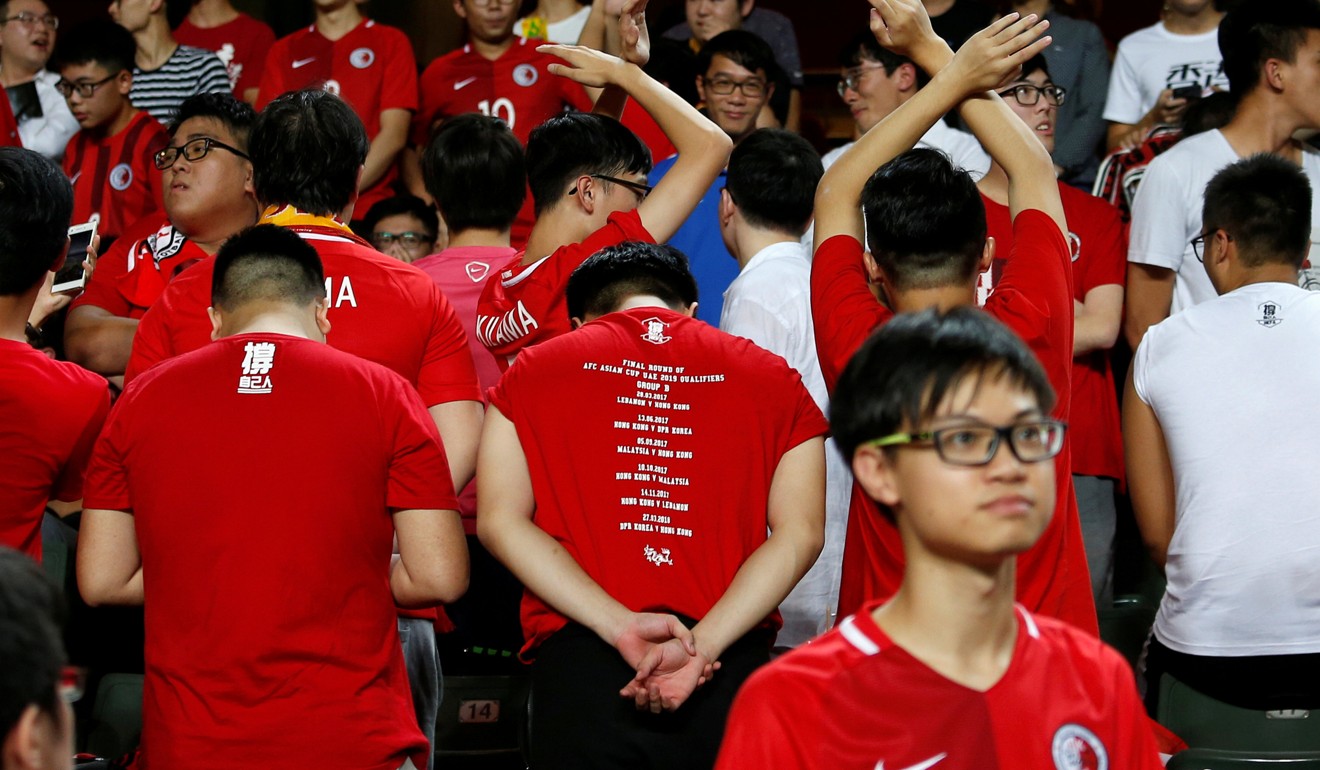
Hong Kong soccer fans risk paying penalty on Chinese national anthem law
- Disrespect for the Chinese anthem is a regular affair among some sections of the crowd at international soccer matches in Hong Kong
- Proposed law will make insulting anthem a crime, but what will happen if thousands boo song together or turn their backs on national flag?
Soccer inevitably comes up when experts discuss Hong Kong’s proposed law which will introduce penalties for insulting China’s national anthem.
One soccer match in particular, on November 17, 2015, stands out. It was during the World Cup qualifiers, with Hong Kong facing China at a packed Mong Kok Stadium, and the Chinese anthem was played.
As the rousing strains of March of the Volunteers picked up, some spectators began booing and chanting: “We are Hong Kong!” and “Hong Kong superb!”
Some unfurled banners with slogans such as “Hong Kong is not China” while others held up signs which said: “Boo.”

The match ended in a 0-0 draw, but the protest during the Chinese anthem made headlines beyond Hong Kong.
What a contrast it was with the scenes when Hong Kong faced Japan on December 12, 2009. That was the soccer final of the 2009 East Asian Games, and nearly 32,000 fans turned up at Hong Kong Stadium in Happy Valley.
Hong Kong’s new anthem law: what you can and cannot do
Everyone stood up for March of the Volunteers, and some were filled with emotion as they sang the song, originally composed for a 1935 film, Children of Turbulent Times, about the political awakening of young enlistees preparing to fight Japanese invaders.
Hong Kong won gold in a penalty shoot-out and the anthem was played again during the medal ceremony.
Dr Lee Chun-wing, an expert on the history of Hong Kong soccer who was at the match, recalled: “Many fans stood up and cheered while the national anthem was being played.”
Lee, a lecturer at Polytechnic University’s Hong Kong Community College, added: “As far as I could see and hear, nobody booed the anthem.”
A year earlier, in 2008, thousands had poured onto the streets of Hong Kong to cheer the Beijing Olympic Games torch relay and 51.9 per cent of Hongkongers polled by the University of Hong Kong (HKU) said they identified themselves as Chinese. It was the highest score since the biannual survey started in 1997, when Britain returned the city to China.
Localist sentiments
Some observers said if Hong Kong had introduced a national anthem law then, it would not have been an issue because residents were generally positive towards Beijing.
But things moved steadily downhill after that, as anti-mainland Chinese sentiment rose in Hong Kong and booing the anthem became a regular affair among some sections of the crowd at soccer matches.
That year, the proportion identifying themselves as Chinese in the HKU survey plunged to just 31.1 per cent. The figure stood at 32 per cent last month.
Political scientist Ray Yep Kin-man of City University said disrespect for the anthem at soccer matches reflected “localism” and anti-mainland sentiment among certain quarters in Hong Kong.
He said the influx of mainland visitors to the city in recent years made Hongkongers anxious about competition in everything from getting a seat on an MTR train to buying property.
Chinese national anthem abuse: ‘two years to investigate is too long’
“The integration between Hong Kong and the mainland has unavoidably caused some inconvenience in the daily life of Hong Kong people. Some Hongkongers feel they are not even respected in the place they call home,” Yep said.
Some Hongkongers feel they are not even respected in the place they call home
Tian Feilong, an associate professor at Beihang University’s Law School in Beijing, said such disrespectful behaviour was unacceptable under the “one country, two systems” principle in place since Hong Kong’s return to China.
“It’s a deviation from identification with the country,” he said.
‘Count some blessings’
The bill, to be presented to the Legislative Council on January 23, introduces a maximum fine of HK$50,000 and three years’ jail as penalties for publicly and intentionally insulting the anthem. It also gives the authorities up to two years to prosecute offenders, compared with six months for other crimes under the Magistrates Ordinance.
Legco could vote on the bill by July, before the summer recess.
Some Hongkongers fear that this will be yet another way of curbing freedom of expression in the city. For them, the need to show respect for symbols of national identification remains a novelty.
But HKU history professor John Carroll thinks Hongkongers can count some blessings.
“Hong Kong people are fortunate to have gone so long without having been subjected to the kind of nationalist indoctrination found in so many countries,” he said.

HKU law professor Simon Young Ngai-man gave credit to Hong Kong officials who drew up the bill, saying it was not a cut-and-paste reproduction of the mainland law and the drafters paid attention to the principles of criminal liability.
“The bill has explicitly and comprehensively provided for the mental element for the criminal offence of insulting behaviour,” he said. “There must be proof of a double intention – intention to insult and intention to commit the acts that constitute the offence. Accidental or even reckless behaviour that may appear insulting will not come within the offence.”
He said that gave some assurance that the law would be used in only a small category of cases where it was obvious that those who altered or distorted the lyrics or score of the national anthem had done so deliberately, for the specific purpose of insulting it.
In search of common sense in Hong Kong’s national anthem debate
It is a forgone conclusion that the bill will be passed, given the majority enjoyed by the pro-establishment camp in Legco, but enforcing it could pose difficulties for police.
What if thousands boo the national anthem or turn their backs on the national flag while the anthem is played during an international soccer match or other event?
Football historian Lee asked: “What if fans hold up portraits of the lyricist of March of the Volunteers, Tian Han, while it is being played during a soccer match? What if some guys do a minute of silence?”
Tian, a top playwright in 20th century China, was jailed during the Cultural Revolution and died behind bars in 1968.
Keeping calm
Mainland academic Tian said he was not worried about possible difficulties in enforcing the law, and expected police to act only when there was concrete evidence. “If there are 10,000 fans booing the national anthem, I think police will only target the instigators, rather than laying charges against all fans,” Tian said.
As far as the bill before Legco was concerned, he said: “The Hong Kong government is just performing its constitutional duty by regulating and sanctioning such behaviour by tabling the proposed national anthem law.”

Carroll expects there will be some conflict over implementing the new law.
“There will be resistance,” he said. “But I imagine there will also be many creative forms of self-expression – not necessarily to show disrespect, but to show that there are other ways to think about nationhood rather than through anthems and flags.”
Yep said there would always be some Hongkongers tempted to seize every opportunity to challenge Beijing, and they would continue to do so even after the bill was passed. Overall though, he expected the situation to stay calm.
Chinese national anthem warning for Hong Kong lawmakers
“I believe the number of people who make deliberate acts to disrespect the national anthem will drop significantly after the law is in place. Beijing will find the situation acceptable as the situation is brought under control,” he said.
Young believes it is inevitable that some will want to test the new law.
“At some point there will need to be a case in the courts on whether the law is unconstitutional for violating the freedom of expression,” he said. “But for most people, and Hong Kong people are quite practical and sensible, I don’t think there will be much new conflict with the law.”

